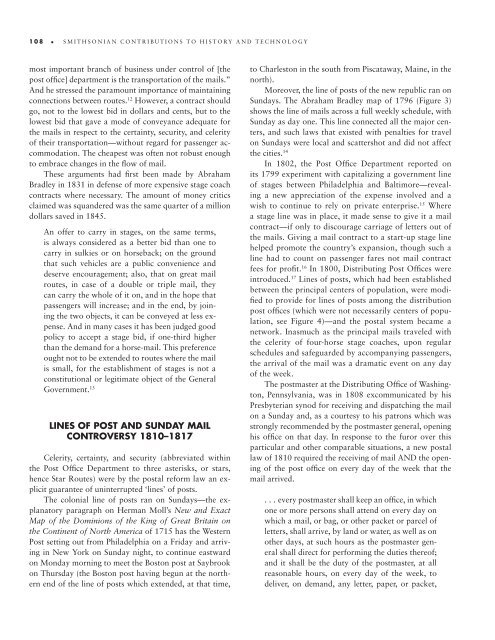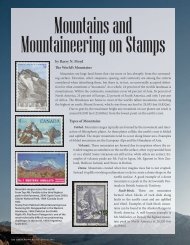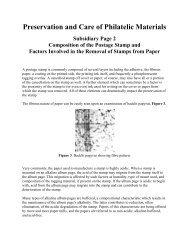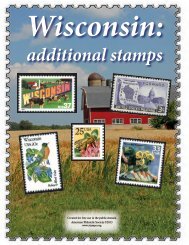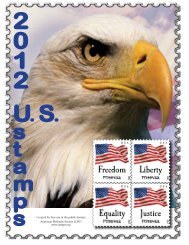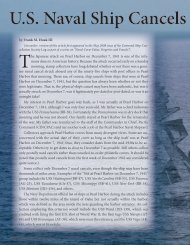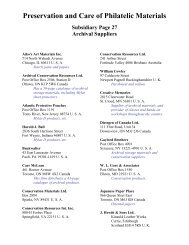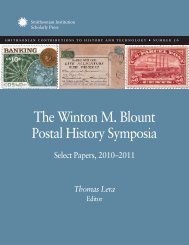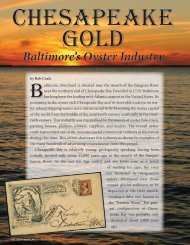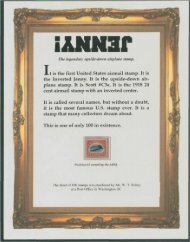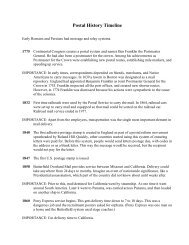The Winton M. Blount Postal History Symposia - Smithsonian ...
The Winton M. Blount Postal History Symposia - Smithsonian ...
The Winton M. Blount Postal History Symposia - Smithsonian ...
- No tags were found...
Create successful ePaper yourself
Turn your PDF publications into a flip-book with our unique Google optimized e-Paper software.
1 0 8 • s m i t h s o n i a n c o n t r i b u t i o n s t o h i s t o ry a n d t e c h n o l o g ymost important branch of business under control of [thepost office] department is the transportation of the mails.”And he stressed the paramount importance of maintainingconnections between routes. 12 However, a contract shouldgo, not to the lowest bid in dollars and cents, but to thelowest bid that gave a mode of conveyance adequate forthe mails in respect to the certainty, security, and celerityof their transportation—without regard for passenger accommodation.<strong>The</strong> cheapest was often not robust enoughto embrace changes in the flow of mail.<strong>The</strong>se arguments had first been made by AbrahamBradley in 1831 in defense of more expensive stage coachcontracts where necessary. <strong>The</strong> amount of money criticsclaimed was squandered was the same quarter of a milliondollars saved in 1845.An offer to carry in stages, on the same terms,is always considered as a better bid than one tocarry in sulkies or on horseback; on the groundthat such vehicles are a public convenience anddeserve encouragement; also, that on great mailroutes, in case of a double or triple mail, theycan carry the whole of it on, and in the hope thatpassengers will increase; and in the end, by joiningthe two objects, it can be conveyed at less expense.And in many cases it has been judged goodpolicy to accept a stage bid, if one- third higherthan the demand for a horse- mail. This preferenceought not to be extended to routes where the mailis small, for the establishment of stages is not aconstitutional or legitimate object of the GeneralGovernment. 13Lines of Post and Sunday MailControversy 1810–1817Celerity, certainty, and security (abbreviated withinthe Post Office Department to three asterisks, or stars,hence Star Routes) were by the postal reform law an explicitguarantee of uninterrupted ‘lines’ of posts.<strong>The</strong> colonial line of posts ran on Sundays—the explanatoryparagraph on Herman Moll’s New and ExactMap of the Dominions of the King of Great Britain onthe Continent of North America of 1715 has the WesternPost setting out from Philadelphia on a Friday and arrivingin New York on Sunday night, to continue eastwardon Monday morning to meet the Boston post at Saybrookon Thursday (the Boston post having begun at the northernend of the line of posts which extended, at that time,to Charleston in the south from Piscataway, Maine, in thenorth).Moreover, the line of posts of the new republic ran onSundays. <strong>The</strong> Abraham Bradley map of 1796 (Figure 3)shows the line of mails across a full weekly schedule, withSunday as day one. This line connected all the major centers,and such laws that existed with penalties for travelon Sundays were local and scattershot and did not affectthe cities. 14In 1802, the Post Office Department reported onits 1799 experiment with capitalizing a government lineof stages between Philadelphia and Baltimore—revealinga new appreciation of the expense involved and awish to continue to rely on private enterprise. 15 Wherea stage line was in place, it made sense to give it a mailcontract—if only to discourage carriage of letters out ofthe mails. Giving a mail contract to a start- up stage linehelped promote the country’s expansion, though such aline had to count on passenger fares not mail contractfees for profit. 16 In 1800, Distributing Post Offices wereintroduced. 17 Lines of posts, which had been establishedbetween the principal centers of population, were modifiedto provide for lines of posts among the distributionpost offices (which were not necessarily centers of population,see Figure 4)—and the postal system became anetwork. Inasmuch as the principal mails traveled withthe celerity of four- horse stage coaches, upon regularschedules and safeguarded by accompanying passengers,the arrival of the mail was a dramatic event on any dayof the week.<strong>The</strong> postmaster at the Distributing Office of Washington,Pennsylvania, was in 1808 excommunicated by hisPresbyterian synod for receiving and dispatching the mailon a Sunday and, as a courtesy to his patrons which wasstrongly recommended by the postmaster general, openinghis office on that day. In response to the furor over thisparticular and other comparable situations, a new postallaw of 1810 required the receiving of mail AND the openingof the post office on every day of the week that themail arrived.. . . every postmaster shall keep an office, in whichone or more persons shall attend on every day onwhich a mail, or bag, or other packet or parcel ofletters, shall arrive, by land or water, as well as onother days, at such hours as the postmaster generalshall direct for performing the duties thereof;and it shall be the duty of the postmaster, at allreasonable hours, on every day of the week, todeliver, on demand, any letter, paper, or packet,


